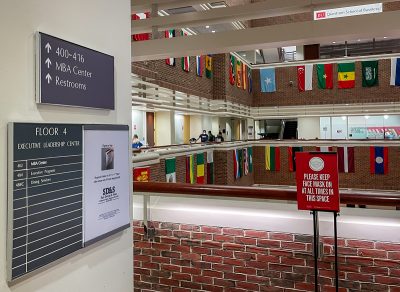“The Internship Fund for Social Impact” applications for Questrom Masters of Business Administration students opened March 1. Students can earn funding through the initiative which seeks to make unpaid and underpaid social impact internships a more feasible option.

The IFSI takes donations from the Questrom community to provide monetary grants to MBA students who want to participate in internships at companies that make a positive impact. These include nonprofits, B Corporations, public sector organizations or minority-owned social enterprises, Gabriella Hakim, president of IFSI and second year MBA student at Questrom, said.
“I participate in this program because this is the direction that I want to see business go in,” Hakim said. “I hope that more and more, there will be fewer and fewer barriers to using a business toolkit and to using an MBA specifically in the social sector.”
Constance Hadley, faculty advisor of IFSI for the past five years, supports the initiative’s mission of creating lasting impact through easing the financial burden of unpaid internships.
“Students have to eat and they have to pay off their student loans, so the more we can allow them to be able to financially support themselves while doing this kind of good work, the better,” Hadley said.
Momoko Hirose, the vice president of operations for IFSI, said the initiative along with Questrom’s social impact program, is unique because it challenges the common perception that business school emphasizes individual success and getting “ahead at the expense of other people.”
She said the strong social impact and community focus allows them to recognize how, “There are solutions where we can help each other out, make great social impact, and be financially viable and sustainable.”
The entire application process goes from March 1 until May 28 — round one of applications close April 2. Applicants fill out a Google Form and the IFSI team assesses whether the applicant’s internship qualifies for the program.
Hakim and the rest of the IFSI team then decide which students the program can fund and how much funding they will receive, with the maximum stipend being $7,000. Last summer, they funded 13 internships.
“Last year, we’re really grateful to say that we were able to fund every student who came to us with an application that qualified for funding,” Hakim said.
Hakim’s advice for applicants is to select an organization they feel passionately about supporting and should establish and maintain a close relationship with their supervisor throughout the process.
Rebecca Thomas, a second year MBA and Master of Public Health student and past recipient of IFSI funding, said the application process was a “streamlined experience” and suggests that those who are looking to apply should have a strong understanding of the internship organization and the work that will be done.
The money she received from IFSI funded her social impact internship out of Bogota, Colombia with two organizations in the healthcare sector.
“I don’t think I would have been able to take on this internship if it was unpaid,” Thomas said. “I really would not be in the place that I am professionally if I didn’t have that internship, and the work that I’ve had has emerged from the internship.”
Thomas now works for this same company part time and may take on a full time job with it after graduation.
Donations to IFSI can be made through a Questrom-generated Google Form or through IFSI’s Donate-A-Day campaign, where students of the Questrom community can choose to donate one day’s worth of their salary to support their peers. Hirose said it is a “great way to show support.”
Hadley said while she enjoys being able to “cheer on and guide the students throughout their journey,” most of the initiative, including the entire application process, is completely student-run.
“I am kind of the resident historian, able to provide the context because the turnover is such that students are only here for two years,” Hadley said. “They try to add a few more sets of notes and instructions for their successors to try to transfer that knowledge forward.”
Hadley has seen “incredible growth” in the program during her time as advisor.
“There’s so much breadth involved in the fund, and every single year, I watched a new group of students deal with whatever the current context is,” Hadley said.
Hakim hopes future leadership will continue to explore different ways to further the organization’s mission.
“I hope that leadership feels empowered to continue this mission and to grow it and to change it as the world grows and changes and to be creative and push the limits of what we feel like is possible,” Hakim said.


























































































































